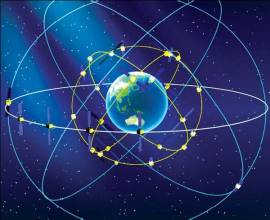

The output value of China’s satellite navigation and location-based service industry reached 211.8 billion yuan ($30.8 billion U.S.) in 2016, up 22.1 percent year on the year, according to an industry white paper released by the Global Navigation Satellite System and Location Based Service (GNSS & LBS) Association of China.
The industry’s core output value totaled 80.8 billion yuan, 70 percent of which came from the country’s self-developed BeiDou Navigation Satellite System (BDS), noted the white paper.
The BeiDou application has been widely used in wearable devices, mobile healthcare, express deliveries, bike-sharing services, disaster prevention and relief, and other fields. China has formulated a three-step strategy for developing the BDS, aiming to complete the deployment of the 35-satellite constellation around 2020 to provide services to global users.
